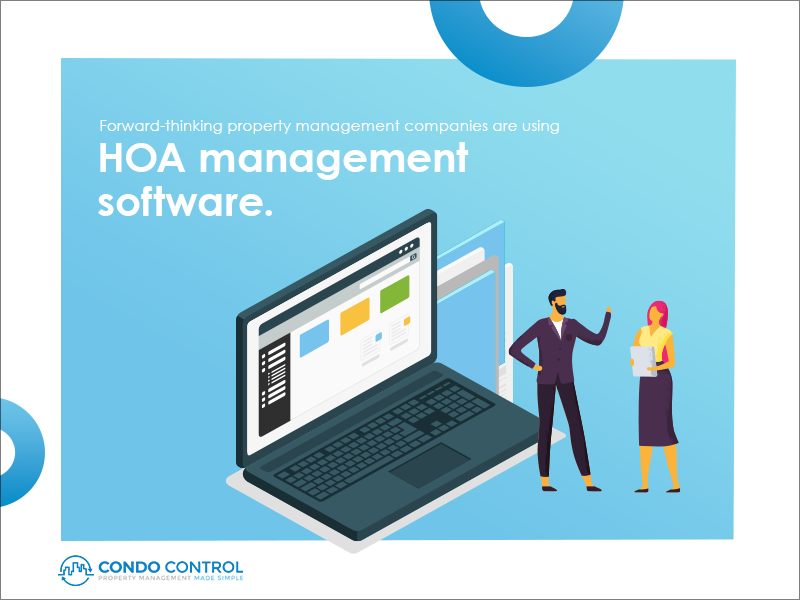It takes a special person to fill a board position in an HOA. This volunteer role requires a lot of time and energy, and owners aren’t always cognisant of just how busy board members are.
Many elected members don’t have any specific expertise that qualifies or prepares them for the tasks that await them (though lucky communities might have someone who has bookkeeping, management or trades experience).
Some boards are comfortable working together to manage their community, but many prefer to hire an HOA management company that can take care of daily operations, maintain property values, and keep owners happy.
What exactly do HOA management companies do?
An HOA management company helps associations optimize operations, spending and communications. The company is hired by an HOA to make things easier and better for owners and the board. Like HOAs, every management company is unique, so it’s impossible to put them all in the same category. But for the sake of simplicity, most companies will assist in 4 major areas:
- Management
- Accounting
- Communications
- Administration
Before assessing companies, HOA boards must be very clear about what they want. Identify what problems or issues you need the management company to solve, and how you expect those solutions to improve or impact the community. Once the board knows what it needs, it will be easier to find a company that best aligns with those needs.
Management companies are aware of how much work it takes to maintain an HOA, and many will take over or assist with tasks like the ones listed below:
- Oversee the maintenance of common areas and the community as a whole
- Maintain records
- Enforce rules, bylaws and CC&Rs
- Collect fees, fines and delinquent payments
- Help determine if there are sufficient funds in the reserve account
- Negotiate vendor contracts
- Hire new vendors
- Oversee projects
- Prepare the agenda and other meeting materials
- Prepare budgets
- Keep board members up to date about new laws or rules that impact their HOA
- Organize community events
- Ensure trash and recycling are collected
- Communicate with owners and residents
- Help resolve owner disputes
While the responsibility to manage the HOA in a fair and responsible manner still rests upon the board, a property manager can take on a lot of the grunt work.
Before hiring a company, make sure to ask them what specific services are included in their standard package, what services come with additional fees, and what services are not available. These answers can be retrieved using a Request for Proposal (RFP). Your RFP should include performance standards on response times, how records will be maintained, and a request for references.
There are different types of property managers
Property management companies are becoming increasingly flexible and may offer custom packages in order to serve the needs of different communities. They may provide a team of managers, or one staff member who specializes in a certain area. Some HOAs will feel more at ease having an onsite manager, while others will be content with an offsite manager helping out.
Financial manager
There are managers who specialize in financial work. These managers will help their clients with:
- Making the association’s financial position clear
- Creating financial reports
- Creating a budget
- Forecasting revenue and expenses
- Managing accounts payable
- Implementing and managing a professional and effective assessment collection policy
A financial manager may not come to the HOA since this work can often be done offsite. HOAs that can’t afford a full property management package, or don’t have a financial expert on the board, may find immense value in hiring a financial manager.
Property manager
These professionals are tasked with the responsibility of maintaining the value of the community, helping owners, communicating with and educating the board, and much more. Property managers may be asked to do things like:
- Coordinate communications with board members
- Take minutes
- Get answers from the board to owners/residents
- Provide a high level of customer service to owners/residents
- Document and maintain records
- Oversee amenity operations
- Ensure vendor contracts are appropriate, competitive and comprehensive
- Complete projects on time and within budget
Property management, when coupled with financial management, is considered “full management.”
Offsite versus onsite manager
Offsite management means the manager is working from a location other than the HOA property. Onsite management means the manager is physically at the HOA community. Onsite managers are more expensive, but they are able to provide a higher level of service because they can have in-person conversations or inspect problems as soon as they are reported.
Portfolio versus general manager
Portfolio managers care for multiple HOAs at the same time, while general managers care for just one property. Portfolio managers are more affordable, but they also have less time to devote to your community. If you are presented with a low management fee when interviewing a company, that may mean you won’t be seeing too much of the manager.
Inhouse manager
Large associations may prefer to have their manager and staff working as direct employees. This gives the HOA more control over management (and generally costs less than hiring a manager from a company). The drawback is that the HOA must find, screen, and supervise the manager.
HOAs have options
Whether this is your first time bringing on a property management company or you’re looking for a new one, boards will quickly discover that there are a lot of options for them to choose from.
According to recent data from the Foundation of Community Association Research, there are 358,000 community associations in the U.S. There are also 55,000 – 60,000 community association managers in the U.S., but not every HOA chooses to hire a management company. It’s estimated that 30% to 40% of community associations are self-managed, meaning they might use professional assistance for specific projects or services, but do not have a regular manager or management company.

Not every HOA management company will be available for hire, but chances are good that you will be able to move forward with at least 2 or 3 quality candidates.
Speaking of options, we’ve found some great ones in these North American cities and states:
Credentials
Credentials can’t tell you about a company’s track record of how connected they are to top vendors, but they are a good starting point. Credentials essentially signal to clients that the company and its staff are qualified to do what they say they can do. Credentials affirm that the company has undergone formal training and is familiar with industry best practices.
Depending on the state, association managers may be required to obtain some type of license. But in most cases, even if it isn’t required, it’s best to shortlist a couple of companies that have recognizable credentials.
Specializations
As mentioned earlier, every property management company is different. Some excel in communications while others are budgeting wizards. Some companies cater to small HOAs while others know exactly how to help large HOAs. If your HOA is looking for something specific, try to find a company that specializes in that area. You can also ask a company what they feel makes them stand out from other management companies.
Some large HOAs have tried hiring multiple management companies that specialize in different areas. It can be advantageous because the HOA can keep fees low and it receives help from multiple professionals, but it can also be challenging because information becomes fragmented; the companies won’t work together as they are probably competitors.
Characteristics/skills
These are qualities that can help you predict how successful an HOA management company and its staff will be at tackling the tasks that plague your board and community. Some common qualities of a great management company include:
Experience
Don’t put too much weight on this, but experience is an important attribute. The longer a company has been in the business, the more likely they’ve encountered really difficult or unusual situations. Seasoned companies are also more likely to have in-depth knowledge of local HOA laws, regulations, and standard operating procedures.
Patience
Even though management companies are hired to maintain or elevate the value of properties, their job requires them to work with many different people. It can be very stressful, especially if they are trying to help an angry owner or contractor who has fallen behind schedule. HOA managers need to be patient and have the ability to perform when emotions are high.
Great communication and people skills
This fits in with the previous point; HOA managers need to have good communication and people skills. They should be able to clearly convey what’s happening at the property, talk business with the board, converse with owners in a simple and professional manner, and negotiate with vendors. Clear, precise communication helps to reduce misunderstandings, delays and costly mistakes.
Organization
Property management is definitely a balancing act. There are so many moving parts to consider, and companies are expected to ensure they’re all running smoothly. In order to stay on top of everything, a property manager must have exceptional organizational skills.
Flexibility
Managers must be flexible and understand how to work with strong personalities. While some communities have no problem taking suggestions from a new management company, others may be apprehensive about relinquishing power or taking direction from a stranger.
Moreover, things don’t always go according to plan. Having the ability to manage through unpredictability is critical. Managers should be comfortable with change and open to ideas.
Assertive
Yes, property managers need to be patient, but they also need to know when it’s time to be proactive and push forward with a project or task. There are times when a manager will need to track down a late payment or put pressure on a contractor.
Good with software
Forward-thinking property management companies are almost certainly using HOA management software. That’s because a reliable software platform like Condo Control benefits the company and the clients. HOA management software helps to keep managers organized, which in turn allows them to provide stronger customer service. However, it also helps boards and residents since they also gain access to tools that assist with communications, record-keeping, and standardization.

Important HOA documents can be securely uploaded and saved to the cloud-based platform, and in many cases, owners can use it to make payments and book amenities. The platform may also provide reports about community activity and progress.
If you already have your own HOA management software, that’s great! Boards are encouraged to have their own software. This way, they don’t risk losing valuable data or information if they end their relationship with the property management company. Just let the company know, and make it clear that you expect the staff to use the platform while they are managing your community.
Benefits of hiring an HOA management company
With the help of a management company, an HOA board can achieve so much more than it could on its own. The best part is there’s no need to delegate all responsibility to a manager, only the demanding everyday tasks that would free the board to focus on more important, long-term goals.
In essence, it’s much easier for an HOA board to fulfill its duties with the assistance of a qualified HOA management company. Here are some of the services that an HOA management company can assist your association with:
Hiring vendors
HOA board members don’t usually have the resources or network connections required to find cost-effective and quality vendors. However, when you delegate this task to a management company, you can have confidence that the firm will have the phone numbers or email addresses of some of the most skilled vendors in the area. That’s because most management companies have long-standing relationships with experienced and qualified vendors. These relationships are often built on a positive reputation underpinned by years of reliability; vendors know they will be working under good conditions and will receive their payments on time.
As such, vendors are willing to negotiate lower rates with management companies that they know, as opposed to HOA board members they’re not familiar with.
Open communication
The great thing about an experienced HOA management company is that they’re not just there to enforce rules and regulations. They also make a concerted effort, through systematic action, to listen to community members and understand their needs so they can cater to them better.
A qualified community management company will ensure that residents feel comfortable expressing their thoughts and ideas in order to foster a happier community.
Consistency
Sometimes, familiarity with neighbors can affect the decision-making of HOA board members, and even lead to unintended preferential treatment. After all, we’re all human.
A management company is different because it has no personal relationships with any of the residents. As such, the manager is able to enforce the association’s rules and regulations without any underlying bias.
Dealing with legal issues
Another responsibility of the HOA management company is to ensure that the association operates according to its own rules and regulations, as well as state legislation.
An experienced HOA manager will bring a wealth of litigation experience and relationships with legal professionals that can benefit the HOA.
Managing expectations
When most people move into a planned community development, they’ll receive association governing documents as part of their welcome pack. But, most people are so busy that they don’t bother to read these drawn-out documents filled with jargon.
However, it’s important for the board to study and understand the HOA’s founding documents, including its policies, bylaws, and CC&Rs.
An experienced HOA management company can work with the board of directors to interpret and clarify the governing documents so that the board is empowered to enforce them fairly and appropriately.
It can be difficult to operate an HOA. It’s a balancing act between keeping owners happy and securing the long-term future of the community. This is more than most HOA board members can handle, and it’s the reason why it might be a good idea to hire an HOA management company.
Conclusion
When done right, hiring an HOA management company can be extremely beneficial for an HOA community. Management companies are trained to help boost productivity and decrease costs for governed communities. Property managers take care of the tedious tasks so that board members can focus on “big picture” items. Together, they can make the HOA better for everyone.
Seasoned management companies can help increase property values, and resolve some of the long-standing issues that have plagued boards or residents. They add immense value and are well worth the investment. But keep in mind that boards must know what they want from the management company before they hire them. Roles and expectations must be clear from the beginning. Furthermore, HOA managers cannot be expected to do everything for the board. The elected community representatives are still responsible for approving rules, ensuring that the HOA remains in good financial health, and taking actions that are in the best interest of the association as a whole.
HOA Management software
For Self-Managed Associations and Property Managers


